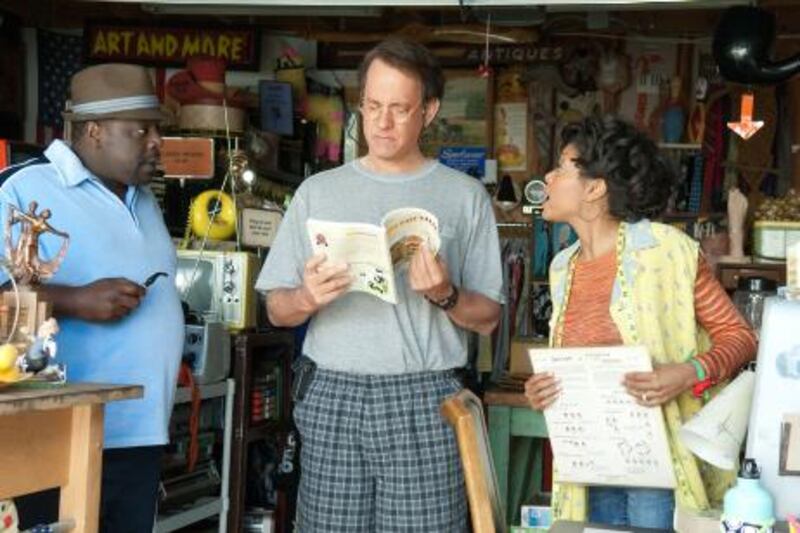Tom Hanks looks nervous as he twiddles a piece of paper between his fingers. Suddenly he puts the rolled paper to his mouth and barks: "Got a light?"
More: Tom Hanks
Taking a beach bum tour of Tom Hanks' Cast Away Island Read article
Toy Story 3 Read article
Angels & Demons Read article
[ More from The National on Film ]
It's obviously a joke but it's also slightly unsettling. Although Hanks is liked and respected in Hollywood, seen as the ultimate nice guy in what can be a nasty town, there is a definite sarcastic edge that he fails to hide entirely.
"I think most of my nice-guy label comes from the fact that I don't mind talking to you," he says, in typical Hanks fashion. Then he laughs to make it clear he means no offence. And he admits: "Not everybody likes me. Dig a little deeper and you'll find people who don't. In my younger days I probably wanted everybody to like me but that's not necessary now. I am who I am and I think I'm a pretty decent guy." At 55, Hanks is one of the most successful and wealthiest actors and producers in the world, winning two Oscars -for Philadelphia and Forrest Gump - three further nominations - for Big, Saving Private Ryan and Castaway - several Emmys and recognition for so much more. He is also the youngest person ever to have received the American Film Institute's Lifetime Achievement award. As he puts it: "My financial security is taken care of."
The actor's situation is the polar opposite of the subject of his latest project, a labour of love called Larry Crowne, which opens in the UAE on Thursday. He co-wrote, directed, produced and starred in the project with his longtime friend Julia Roberts.
It is also a timely tale, considering the economic climate in the US. Hanks plays Larry, an amiable and loyal box company worker who finds himself downsized. Out of work and struggling with the financial toll from a divorce and a large mortgage, he enrols at his local community college. There he reinvents himself and becomes involved with his public-speaking teacher, played by Roberts.
Like the character Larry Crowne, Hanks rides a motor scooter around Los Angeles, where he has lived for 35 years. Unlike Crowne, he is still married - albeit for the second time - and has been since 1988 to the actress Rita Wilson.
"People say 'Geez, it must be hard to stay married in show business'," he says. "I think it's hard to stay married absolutely anywhere, but if you marry the right person, it might work out. We give each other a natural sense of support for whatever the other wants to pursue."
Larry Crowne is a story that had been germinating in Hanks's mind for many years: throughout his acting career he continued to make notes and build mental scenes as he reflected upon the emotional toll of unemployment and the idea of what would happen to a man who starts over at a point in his life that many would find unthinkable.
He has incorporated into the story the struggle with poverty and financial setbacks he experienced as an actor in his early twenties. "There was a period of time in Los Angeles when I wondered if I was just going to lose everything," he says. "My TV show had been cancelled; nothing else had gone anywhere; some alliances I had made petered out and nothing came of them and I was looking at a long, long year ahead of me in which there was no work on the horizon, the phone wasn't ringing, I had two kids, one of them a brand-new baby, and I didn't know if I would be able to keep my house."
He persevered and gradually climbed back up the ladder to success, although he received little encouragement from his father.
"My dad was in the restaurant business and he could not fathom why I didn't want to become the assistant manager of the Jack in the Box down the street," he says. "He said: 'Any knothead could be assistant manager in six months.' I said: 'Thanks for the praise.'"
Pursing his dream of performing on Broadway, he moved to New York, instead snagging a role in the low-budget horror film He Knows You're Alone. At the same time he landed the co-starring spot in the short-lived cult television comedy Bosom Buddies. A guest appearance in an episode of Happy Days led to Ron Howard casting him as the male lead in Splash opposite Daryl Hannah. He has had enough big roles - 1988's Big, 1993's Sleepless in Seattle and Philadelphia, 1994's Forrest Gump, followed by his portrayal of the real-life astronaut Jim Lovell in 1995's Apollo 13 - that he survived a run of so-so comedies including Turner & Hooch and Joe Versus the Volcano. He has acted less in recent years - aside from The Da Vinci Code, Angels & Demons and Charlie Wilson's War, as well as his Toy Story voice-over work - and instead favoured producing television series and films.
For a while, Hanks felt a nagging urge to return to the stage. He once talked to Sam Mendes, who directed him in The Road to Perdition, about appearing in a play in London's West End, but ultimately decided against it.
"I would have done it in a minute, but the problem is life gets in the way," he says. "The idea of going off and doing a protracted stage show somewhere else is tempting - but I can't do it. There's only so much time in the year."
He has spent the best part of the past three years working on bringing Larry Crowne to the screen, the first film he has written and directed since That Thing You Do! 15 years ago.
He is, he thinks, much more patient now than he was the last time he tried his hand at directing.
"When I did That Thing You Do! I was so pent up with trying to capture the image of it that I probably gave up on some things I shouldn't have given up on and rushed through some things, but now I am much calmer because at the beginning of the day I say: 'We are going to take our time. I am going to have the patience to get what I truly want today.'" Age might have something to do with Hanks's attitude this time around. Unlike many of his Hollywood contemporaries, he makes no attempt to hold back the clock.
"I like getting older," he says. "You can't stop it and you can't put it off. I've never felt more than 27. I've never looked back and yearned for the magnificent old days where I looked better or felt different. I'm content with what's happening. I embrace every birthday that comes along and I get to have more interesting challenges thrown in front of me." Those who have worked with Hanks have only good things to say about him, which could be because he picks his associates and employees carefully and treats them courteously and with respect - something he clearly expects in return.
"Look, in this life there is no substitute for absolute honesty in the way you govern yourself and in those you make alliances with. There are people out there who lie very easily and don't think anything about it. They say, 'Well, this is all part of living, man, you have to accept the lie.' But I refuse to accept that. If you lie to me, you're going to be in big trouble.
"I think by and large I'm a good-natured man and I give everybody a fair shake, but if someone takes advantage of that good nature, then they're going to suffer my wrath."





